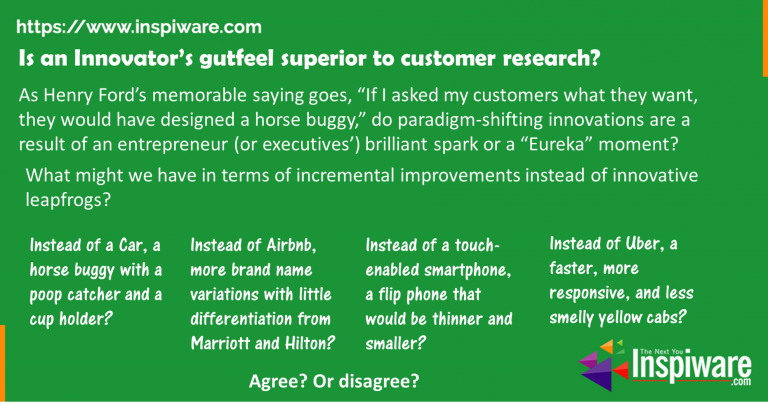Which is better? Entrepreneurial instinct versus customer research.
Is an Innovator’s gutfeel superior to customer research?
As Henry Ford’s famous saying goes, “If I asked my customers what they want, they would have designed a horse buggy,” do paradigm-shifting innovations are a result of an entrepreneur (or executives’) bright spark or a “Eureka” moment?
What might we have regarding incremental improvements instead of innovative leapfrogs?
Instead of a Car, a horse buggy with a poop catcher and a cup holder?
Instead of a touch-enabled smartphone, a flip phone that would be thinner and smaller?
Instead of Uber, a faster, more responsive, and less smelly yellow cabs?
Instead of Airbnb, more brand name variations with little differentiation from Marriott and Hilton?
It is a well-known fact that brilliant ideas that upend industries are not necessarily a result of committees deliberating in corporate settings but mostly two guys (and increasingly women) in a garage. The whole edifice of Silicon Valley is built on the premise of small startups changing the world. (And many other areas in the world are following the lead of Silicon Valley and regions as diverse as Austin, TX, Tel Aviv (Israel), Tallinn (Estonia), Singapore, and major hubs in China.)
Does that mean innovation only occurs in startups and that it is impossible in large companies? Not necessarily. It was years ago, but XEROX PARC (Palo Alto Research Center) sparked the personal computing revolution. While well-funded startups do account for many innovations, still the legacy firms dominate in traditional pharmaceuticals and biotech areas. While they may not set the world on fire, many of the consumer product innovations still flow out of giant multinationals. And in disciplines like artificial intelligence, large firms are making tremendous headway.
One can bring up example after example of entrepreneur instinct trumping conventional wisdom with a sprinkling of innovations from large firms.
Entrepreneurial instinct versus customer research
But this debate is not about small versus large, startup versus established; it is about entrepreneurial instinct versus consumer research.
Of course, if the benchmark is Steve Jobs or Elon Musk, then the comparisons will not be apples to apples. Every generation, some exceptional individuals defy convention.
Is traditional customer research dead if all the innovations are directly attributable to a few select individuals’ brainwaves?
It’s not necessarily true as customer research has many connotations and manifestations. Customer research can be formal or informal. Customer surveys may be about current experience or desired features. Focus groups can be on any topic. User shadowing and experience monitoring are other ways companies analyze user behavior. And with today’s data analytics and machine learning capabilities disciplines such as customer analytics is entering a new phase.
Even an entrepreneur’s brilliant idea may have genesis from their personal or family/friends’ experiences. For example, several robo advisory services were borne out of the frustration of their founders about lack of transparent, inexpensive, and fact-based investing advice.
Pierre Omidyar’s desire to buy and sell Pez dispensers led to the phenomenon that is eBay.
Assuming the idea is a brilliant spark in a vacuum, executives or entrepreneurs still validate their beliefs by seeking user inputs and iterate incrementally to reach the desired product/market fit.
And in the case of enterprise software (business to business), every idea goes through several refinements based on enterprise clients needs that typically go beyond traditional features.
So, while breakthrough innovations may not emanate out of a focus group directly, incorporating customer views, experiences, and needs is an integral part of the innovation cycle.


